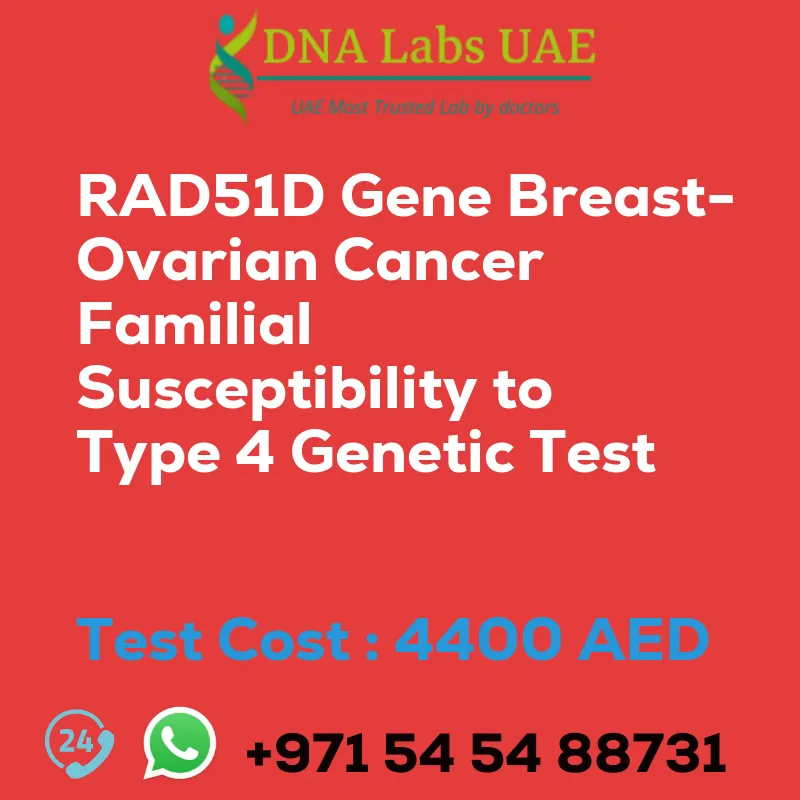RAD51D Gene Breast-Ovarian Cancer Familial Susceptibility to Type 4 Genetic Test
At DNA Labs UAE, we offer the RAD51D Gene Breast-Ovarian Cancer Familial Susceptibility to Type 4 Genetic Test. This specific genetic test uses Next-Generation Sequencing (NGS) technology to analyze the RAD51D gene for mutations or variations.
Test Components
- Price: 4400.0 AED
- Sample Condition: Blood or Extracted DNA or One drop Blood on FTA Card
- Report Delivery: 3 to 4 Weeks
- Method: NGS Technology
- Test Type: Cancer
- Doctor: Oncologist
- Test Department: Genetics
Pre Test Information
Prior to undergoing the RAD51D Gene Breast-Ovarian Cancer Familial Susceptibility to Type 4 Genetic Test, it is important to provide the clinical history of the patient. Additionally, a genetic counseling session may be conducted to draw a pedigree chart of family members affected by RAD51D Gene Breast-Ovarian Cancer Familial Susceptibility to Type 4 NGS Genetic DNA Test gene RAD51D.
Test Details
The RAD51D Gene Breast-Ovarian Cancer Familial Susceptibility to Type 4 Genetic Test is used to determine an individual’s susceptibility to developing breast and ovarian cancer, particularly in families with a history of these cancers. The RAD51D gene is responsible for repairing damaged DNA and maintaining the stability of the genome. Mutations in this gene can impair its function, leading to an increased risk of developing breast and ovarian cancer.
NGS technology allows for the analysis of multiple genes simultaneously, providing a comprehensive assessment of genetic variations that may contribute to cancer susceptibility. By identifying mutations or variations in the RAD51D gene, this test can help individuals and their healthcare providers make informed decisions about cancer prevention, screening, and treatment options.
It is important to note that a positive result from this genetic test does not guarantee the development of breast or ovarian cancer. However, it indicates an increased risk, and individuals with positive results may benefit from enhanced surveillance and preventative measures.
It is recommended that individuals considering this test consult with a healthcare professional or genetic counselor to discuss the potential benefits, limitations, and implications of the test results.
| Test Name | RAD51D Gene Breast-ovarian cancer familial susceptibility to type 4 Genetic Test |
|---|---|
| Components | |
| Price | 4400.0 AED |
| Sample Condition | Blood or Extracted DNA or One drop Blood on FTA Card |
| Report Delivery | 3 to 4 Weeks |
| Method | NGS Technology |
| Test type | Cancer |
| Doctor | Oncologist |
| Test Department: | Genetics |
| Pre Test Information | Clinical History of Patient who is going for RAD51D Gene Breast-ovarian cancer, familial, susceptibility to, type 4 NGS Genetic DNA Test. A Genetic Counselling session to draw a pedigree chart of family members affected with RAD51D Gene Breast-ovarian cancer, familial, susceptibility to, type 4 NGS Genetic DNA Test gene RAD51D |
| Test Details |
RAD51D Gene Breast-ovarian cancer, familial, susceptibility to, type 4 is a specific genetic test that uses Next-Generation Sequencing (NGS) technology to analyze the RAD51D gene for mutations or variations. This test is used to determine an individual’s susceptibility to developing breast and ovarian cancer, particularly in families with a history of these cancers. The RAD51D gene is involved in repairing damaged DNA and maintaining the stability of the genome. Mutations in this gene can impair its function, leading to an increased risk of developing breast and ovarian cancer. NGS technology allows for the analysis of multiple genes simultaneously, providing a comprehensive assessment of genetic variations that may contribute to cancer susceptibility. By identifying mutations or variations in the RAD51D gene, this test can help individuals and their healthcare providers make informed decisions about cancer prevention, screening, and treatment options. It is important to note that a positive result from this genetic test does not guarantee the development of breast or ovarian cancer. However, it indicates an increased risk, and individuals with positive results may benefit from enhanced surveillance and preventative measures. It is recommended that individuals considering this test consult with a healthcare professional or genetic counselor to discuss the potential benefits, limitations, and implications of the test results. |








